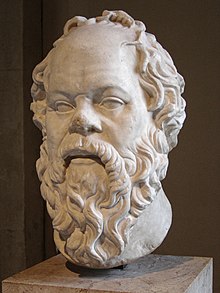Sócrates
| Socrates | |
|---|---|

A bust of Socrates in the Louvre
|
|
| Born | 470/469 BC Deme Alopece, Athens |
| Died | 399 BC (aged approx. 71) Athens |
| Cause of death | Sentenced to death by drinking a poison |
| Era | Ancient philosophy |
| Region | Western philosophy |
| School | Classical Greek |
|
Main interests
|
Epistemology, ethics |
|
Notable ideas
|
Socratic method, Socratic irony, I know that I know nothing |
|
Influences
|
|
|
Influenced
|
|
Socrates (/ˈsɒkrətiːz/;Greek: Σωκράτης [sɔːkrátɛːs], Sōkrátēs; 470/469 – 399 BC) was a classical Greek (Athenian) philosopher credited as one of the founders of Western philosophy. He is an enigmatic figure known chiefly through the accounts of classical writers, especially the writings of his students Plato and Xenophon and the plays of his contemporary Aristophanes. Plato's dialogues are among the most comprehensive accounts of Socrates to survive from antiquity, though it is unclear the degree to which Socrates himself is "hidden behind his 'best disciple', Plato".
Through his portrayal in Plato's dialogues, Socrates has become renowned for his contribution to the field of ethics, and it is this Platonic Socrates who lends his name to the concepts of Socratic irony and the Socratic method, or elenchus. The latter remains a commonly used tool in a wide range of discussions, and is a type of pedagogy in which a series of questions is asked not only to draw individual answers, but also to encourage fundamental insight into the issue at hand. Plato's Socrates also made important and lasting contributions to the field of epistemology, and his ideologies and approach have proven a strong foundation for much Western philosophy that has followed.
...
Wikipedia
